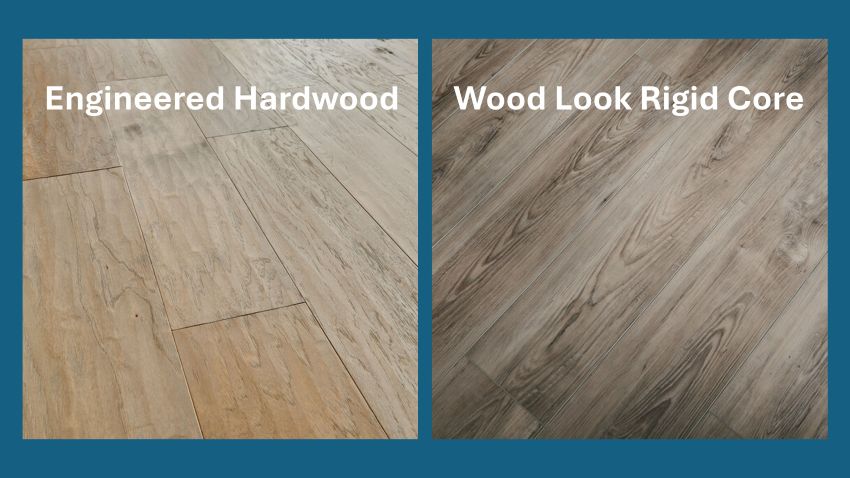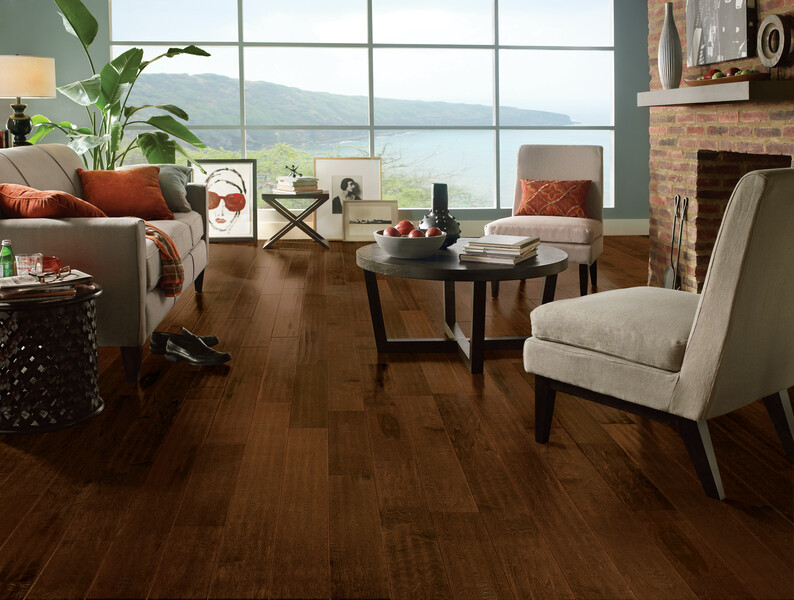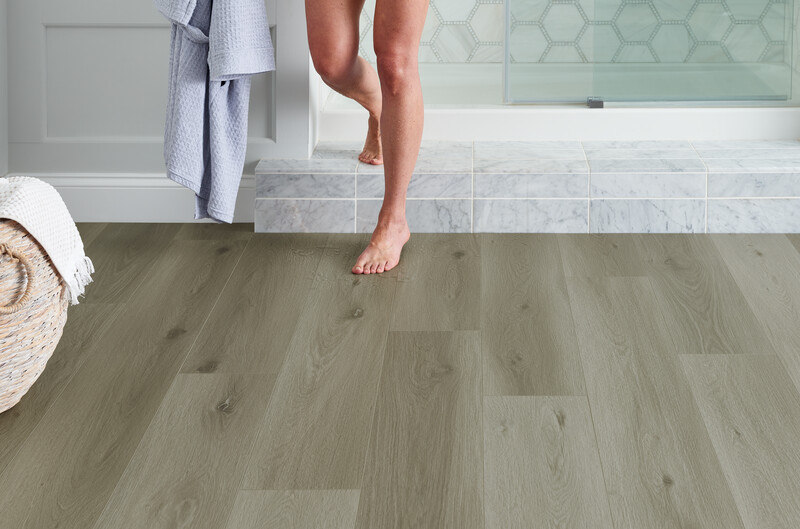Rigid Core vs. Engineered Hardwood – Pros and Cons
March 7, 2025
Two popular flooring options for your home are rigid core flooring and engineered hardwood flooring. Both offer durability, water resistance, and style, but key differences can influence your decision.

What is Rigid Core Flooring?
Rigid or rigid core vinyl flooring is a luxury vinyl plank (LVP) type. The flooring shines for its moisture resistance, easy installation, and scratch-resistant surface. It includes two options:
WPC (Wood Plastic Composite)
WPC flooring features a wood-polymer composite core. That makes it slightly softer and more comfortable underfoot. It provides excellent moisture resistance and is a great choice for residential spaces where comfort is a priority. WPC also has sound-absorbing properties, making it ideal for bedrooms, living rooms, and multi-story homes.
SPC (Stone Plastic Composite)
SPC flooring has a stone-polymer composite core, which makes it denser, more rigid, and highly durable. The SPC rigid core is 100% waterproof and resists dents, scratches, and wear and tear better than WPC. This option is ideal for high-traffic areas, kitchens, bathrooms, and commercial spaces where durability is a top concern.
What is Engineered Hardwood Flooring?
Engineered hardwood flooring combines the beauty of real wood with enhanced stability and moisture resistance. Although solid hardwood flooring sets the gold standard, it can fail under certain conditions like moisture-prone basements.
Engineered wood removes that concern using a real wood veneer on top of a plywood or high-density fiberboard (HDF) core. This layered construction provides better resistance to moisture and temperature changes, allowing you to install engineered hardwoods in basements, kitchens, and areas where humidity fluctuates.
Like solid wood flooring, engineered hardwood comes in various wood species, finishes, and plank sizes. You get the authentic look and feel of traditional hardwood with greater versatility.
Both rigid core and engineered hardwood are perfect alternatives to solid hardwood flooring. The question becomes which to use. We’ll help you decide by covering the pros and cons of each.
Cost of Engineered Hardwood vs. Rigid Core
Let’s start by discussing costs. Both flooring options are less than installing solid hardwoods.
For example, engineered hardwood costs $4.50 per square foot for click-lock planks in oak or maple. Typical flooring costs are $4.50 to $16.00 per square foot (The Spruce).
Compare that to solid hardwoods ranging from $5.00 to $28.00 per square foot for unfinished wood. Prefinished hardwood flooring generally costs $6.00 to $12.00 per square foot (The Spruce).
While rigid core flooring is more affordable than solid hardwood, its price is comparable to engineered hardwood. It ranges from $10 to $12 per square foot (Today’s Homeowner).
Pros and Cons of Engineered Hardwood Flooring
As mentioned, engineered hardwood flooring’s layered construction makes it more stable than solid hardwood flooring. It provides the beauty of traditional hardwood while offering improved resistance to moisture and temperature changes.
But how does the flooring compare against rigid core for pros and cons?

Pros of Engineered Hardwood
✅ Authentic Wood – Made with a wood veneer, engineered wood floors offer the timeless charm of solid hardwood flooring.
✅ Moisture Resistance – The layered construction reduces the risk of water damage.
✅ Refinishing – You can refinish some engineered hardwoods, but it depends on the thickness of the wear layer. Thicker wear layers allow for sanding and refinishing, extending the floor’s lifespan. That extends their life in many cases to 50 years or more.
Consider, too, that manufacturers like Hartco® offer a lifetime warranty on some of their engineered hardwoods, like American Scrape.
✅ Variety of Styles – Available in various wood species, finishes, and textures to match different home designs.
Cons of Engineered Hardwood
❌ Water-Resistance – Engineered wood floors handle moisture better than solid hardwood but are not entirely waterproof. Extended exposure to standing water can still cause swelling or warping. That said, some companies like Hartco have engineered wood that’s waterproof. Witness its HydroBlok™ engineered hardwood flooring.
❌ Scratch-Resistance – While durable, it can still show signs of wear and tear over time, especially in high-traffic areas.
Pros and Cons of Rigid Core Flooring
Rigid core flooring is an advanced type of LVP flooring. Its solid, waterproof core is made from stone plastic composite (SPC) or wood plastic composite (WPC). The flooring mimics the wood look while offering exceptional moisture and scratch resistance.

Pros of Rigid Core Flooring
✅ 100% Waterproof – SPC flooring and WPC rigid core are fully waterproof, making them ideal for bathrooms, kitchens, and basements.
✅ Scratch & Stain Resistant – The wear layer protects against daily wear and tear, making it a great choice and excellent for pets and children.
✅ Easy to Install – Many rigid core flooring products feature a click-lock system, allowing DIY-friendly installation.
✅ Comfortable Underfoot – WPC rigid core offers a slightly softer feel than SPC flooring, making walking more comfortable.
Cons of Rigid Core Flooring
❌ Not Real Wood – While high-quality rigid core flooring looks like wood flooring, it lacks the authentic feel of engineered wood floors.
❌ Refinishing – Unlike engineered hardwood, the flooring must be replaced once the top layer wears down. Still, you can purchase rigid core flooring like Everguard™ Classic Plus, which owns a 35-year residential warranty.
❌ Underfoot Comfort – SPC flooring is firmer and less forgiving on the feet, while WPC rigid core offers more comfort.
How to Choose Between Rigid Core and Engineered Hardwood
Selecting the right flooring option depends on several factors, including moisture resistance, durability, installation, and aesthetic preferences. Rigid core flooring excels in high-traffic and moisture-prone areas. Engineered hardwood flooring offers the timeless beauty of real wood with added stability.
Understanding these key differences will help determine which flooring best suits your home and lifestyle.
1. Consider Water Resistance
Rigid core flooring is the best choice for a moisture-prone area like a bathroom or basement, as it is 100% waterproof. Engineered hardwood is a good compromise for those seeking water resistance while maintaining the beauty of real wood. Just remember, it still has the frailties of solid wood, though to a lesser extent. For confident, waterproof performance, a rigid core is your best bet.
2. How Durable Must Your Floors Be?
Do you have pets, kids, or high foot traffic? Rigid core flooring is a beast — scratch-resistant, stain-resistant, and easy to maintain. The trade-off is that your floors will last between 25-35 years. You can refinish most engineered hardwoods to extend their life and your investment for decades.
3. Consider Installation & Budget
Rigid core flooring with a click-lock system simplifies the DIY installation process. You can float the floors without gluing.
You can do the same with engineered hardwood. However, glue or nail it to a subfloor for the most stable installation. You’ll also need to acclimate wood flooring to your room.
4. How Important is Real Wood to You?
If you love the authenticity of real wood, engineered hardwood flooring is your best option. Rigid core flooring is an excellent alternative for a wood look with high durability and lower maintenance. But remember, rigid core is vinyl-based.
Rigid Core vs. Engineered Hardwood – Which Flooring is Right for You?
Both rigid core and engineered hardwood flooring offer high-quality options for different needs. Engineered wood floors are perfect for those who love traditional hardwood with a real wood veneer and refinishing capabilities.
Meanwhile, rigid core flooring provides a waterproof, scratch-resistant, easy-to-install alternative. You’ll have difficulty finding a better solution for heavy-duty, high-traffic areas. If waterproof performance is a must, you have limited options for wood-look flooring.
At Hartco, we offer a wide selection of rigid core and engineered hardwood flooring to match your style and performance needs. We also provide some of the best warranties in the business, so you won’t have to compromise on finding the perfect floor for your space.
Ready to upgrade your floors? Explore Hartco’s collection of engineered hardwood and rigid core flooring to find the perfect match for your home. Visit your nearest Hartco retailer to see our best-in-class warranties and styles in person!
